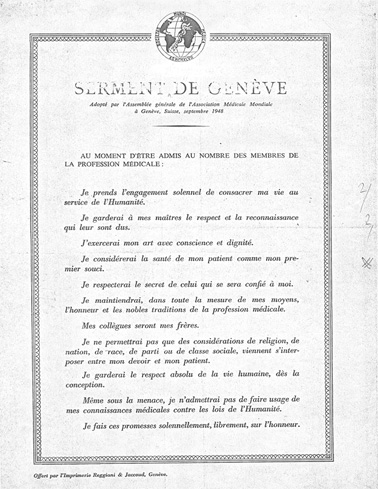Code of Ethics
Duties to patients
The trust relationship between the dentist and the patient is a prerequisite for therapeutic success . With this in mind , the practitioner and the patient are considered as partners with equal rights , linked by a relationship based on mutual respect and transparency of information.
Art . 1
Under the legislation, members of the SSO voluntarily submit to the Code of Ethics and agree to behave according to the principles that are formulated .
The Code of Ethics is to define the relationship between the dentist and its environment , and to ensure the reputation and freedom of the practicing dentistry . The rules of the code of ethics should include
- Promote trust between dentist and patient
- Promoting professional and ethical skills of dentist
- Promote collegiality among practitioners
- Promote professional behavior following ethics; to define, to prevent and help penalize any infringements
Art . 2
The dentist operates independently , which assistants
- Free choice of practitioner by the patient
- Freedom for the practitioner to accept or refuse a patient, except in an emergency or imperative medical indication
- Freedom for the practitioner , as part of their professional skills , to choose the treatment plan and prescription drugs , and freedom for the informed patient to decide whether to execute the therapy or not.
- Strict observance of medical confidentiality ( secrecy and patient)
Art . 3
The dentist will practice diligently and closer to his conscience. He is personally liable for his professional acts .
The dentist who does not exercise in its own name ( employee not working for its own account) ensure that the patient clearly know to whom he entrusts his therapeutic mandate.
Art . 4
The dentist contracts a sufficient professional liability insurance.
Art . 5
Maintaining oral health of the patient should be the primary goal of professional dentist . Diagnostic and therapeutic methods will be tailored to individual needs , desires and possibilities of each patient. They take into account the economic and social situation of the patient.
Art . 6
The dentist is aware of the limits of his competences and of his professional skills . He must maintain his professional knowledge and management by following regular continuing education courses .
The dentist should not arouse exaggerated hopes of therapeutic success.
Art . 7
The dentist clearly informs the patient about the findings , diagnosis , therapeutic measures envisaged and their cost. He mentions in particular the known risks and discusses the appropriate treatment alternatives with the patient .
If it appears that the cost of treatment exceeds the estimated fees of more than 15% , the patient must be informed without delay.
Art . 8
The name of the license holder to exercise responsible must appear on the bill of costs .
Art . 9
The patient is entitled to a detailed bill. This will include at least the tariff charged , a brief explanatory text , number, the total number of points and the point value .
Art . 10
In case of dispute , the dentist will seek a friendly solution . If necessary, send the patient to the Commission of medico – dental authority ( called Geneva Conciliation ) . However, if the claim is justified, we should not hesitate to take the dispute to court.
Art . 11
Certificates and diagnostics of convenience are prohibited.


